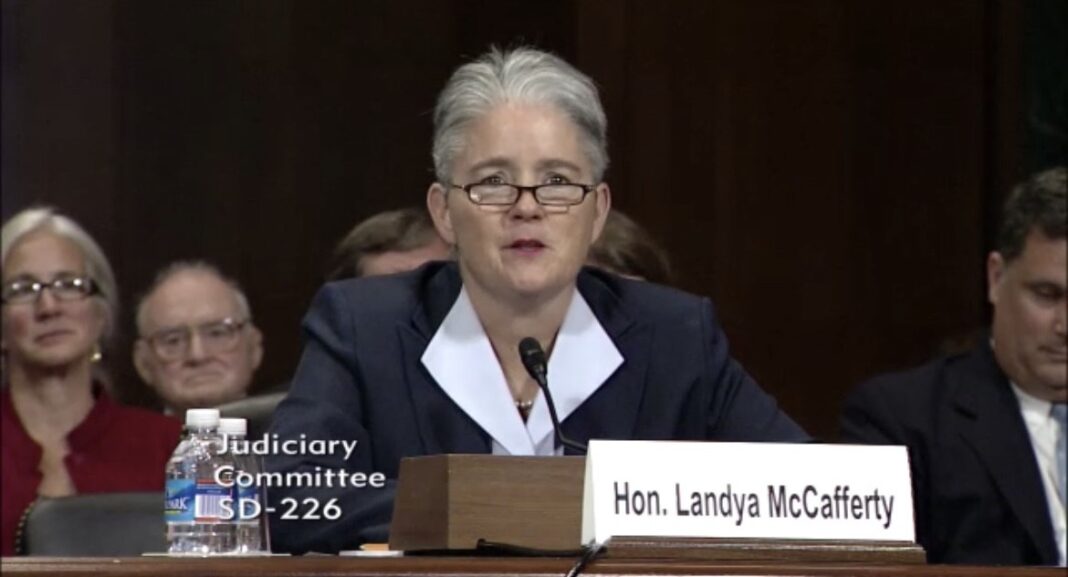An Obama-appointed federal judge has ruled that two teenage boys in New Hampshire who identify as girls can compete in female school sports teams despite a state law banning it. Earlier this year New Hampshire enacted the Fairness in Women’s Sports Act requiring public schools to classify athletic teams based on biological sex at birth and therefore prohibiting transgender students from playing on teams that instead align with their so-called gender identity. Dozens of states have passed similar laws and last year federal legislation was introduced to ban individuals of the male sex from participating in programs or activities that are designated for women or girls. The measure, which President Biden has promised to veto, states that “sex shall be recognized based solely on a person’s reproductive biology and genetics at birth.”
Under New Hampshire’s law transgender athletes in grades 5-12 must play sports on teams that align with their biological sex rather than gender identity. The measure also requires schools to designate all teams as either girls, boys, or coed, with eligibility determined based on a student’s birth certificate “or other evidence.” The goal is to protect girls from the potential risks and injuries of competing against bigger and stronger transgender athletes, state officials say. When Governor Chris Sununu signed the bill in mid-July he said it “ensures fairness and safety in women’s sports by maintaining integrity and competitive balance in athletic competitions.” The Republican governor also pointed out that the law is widely supported throughout the nation with nearly half of all U.S. states taking similar action.
With the help of a leftist civil rights group, two boys—15-year-old Parker Tirrell and 14-year-old Iris Turmell—sued the Granite State to participate in girls’ sports, asserting that the law discriminates against transgender students in violation of the Equal Protection Clause of the Fourteenth Amendment to the United States Constitution and Title IX of the Education Amendments of 1972. The boys allege that the measure denies them equal educational opportunities and singles them out for discrimination solely because they are transgender girls, in violation of federal law. The Fairness in Women’s Sports Act denies them the many educational, social, physical and mental health benefits that come with playing sports and isolates them from friends and teammates, according to their complaint, which explains that each has been diagnosed with gender dysphoria, a health condition characterized by distress resulting from an incongruence between one’s birth sex and gender identity. “As part of their prescribed medical treatment for gender dysphoria, Parker and Iris live and interact with others as girls in every aspect of their lives; they are accepted as girls by their parents, family, schools, peers, teammates, and coaches,” the complaint states, adding that both teens are “receiving puberty-blocking medication and hormone therapy to align their bodies with their female identities and to alleviate the distress of physical characteristics that conflict with their gender identity.”
This week Judge Landya McCafferty, appointed to the bench in 2013 by Obama, blocked the enforcement of New Hampshire’s law, ruling that it discriminates against transgender students. The requirement that students stick with their biological sex at birth for sports teams is an obvious legal mechanism to discriminate against transgender girls, according to the judge. “Indeed, transgender girls are the only group whom the Act bars from playing on the team associated with their gender identity,” McCafferty writes in her 48-page order. The disparate treatment of transgender girls is clear in the statute and the “singling out of transgender females is unequivocally discrimination,” the judge writes. She further notes that the transgender athletes are unlikely to have any physical advantage over their female teammates because both are receiving female hormone therapy. “Neither Parker nor Iris have undergone male puberty,” Judge McCafferty’s order states. “Neither of them will undergo male puberty. Both have received hormone therapy to induce female puberty, and both have developed physiological changes associated with female puberty. It is uncontested that there is no medical justification to preclude Parker and Iris from playing girls’ sports.”
The judge also provides a lesson on gender identity and dysphoria, writing that the first is an accepted medical term for a person’s innate sense of gender, which may or may not align with their biological sex or anatomy. Gender dysphoria is a “highly treatable” medical condition resulting from a lack of alignment between one’s birth sex and gender identity that if left untreated may result in anxiety or depression, eating disorders, substance abuse, and even suicide, Judge McCafferty writes.
















